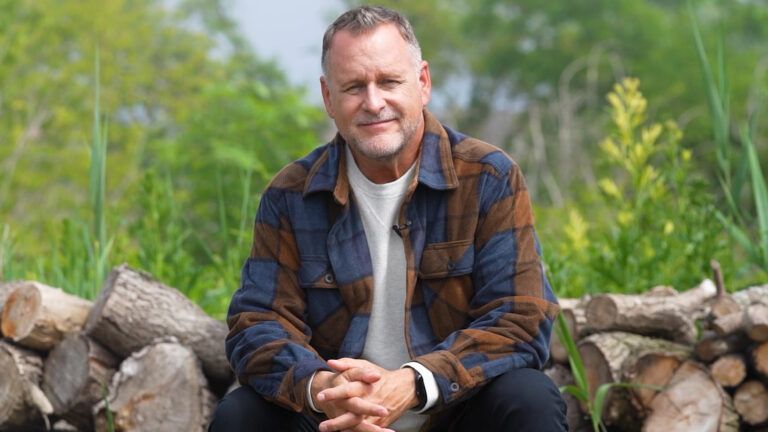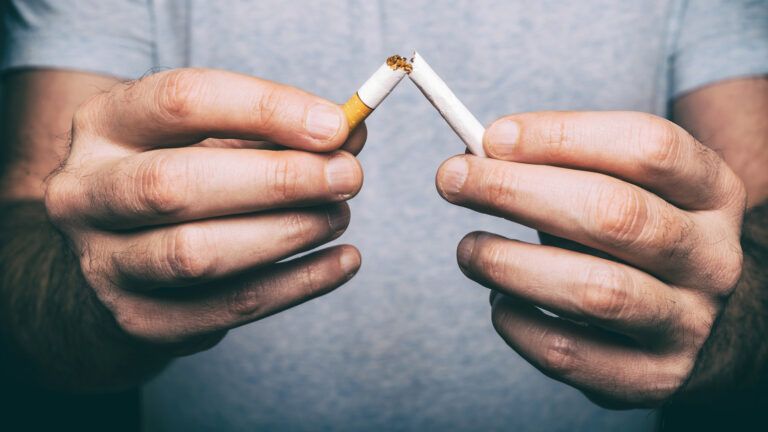It was probably the most un-Christmaslike question I could imagine. I sat outside the house one evening just after the holiday with my older son, Michael—my 22-year-old overgrown kid, his rail-thin body slumped next to mine, a cross-shaped silver pendant hanging from his neck. I’d given him the necklace for Christmas. Now it seemed like the most useless gesture in the world. “Michael,” I said, my voice shaking, “are you doing drugs?”
Michael’s head snapped up. He looked into my eyes—that face, once so sweet, now hard and withdrawn. “No, Mom, I’m not,” he said. And that was all. He just kept looking at me. But his eyes seemed to be someplace else. I fumbled for something else to say. Nothing came. I got up and went back into the house.
I should have said something. It wasn’t right, Michael’s behavior, not since we’d moved back to Texas. We’d been living in southern Washington state for 11 years—moved there after my husband and I divorced and he basically walked out of our lives. We’d come back to Texas when the kids—Michael and his younger brother, Cody—were teenagers, to be closer to family. We’d bought a five-acre spread big enough for all of us, including my parents, in Azle, a semi-rural suburb of Fort Worth, and I’d found another job and had even begun dating a man named Tom.
It seemed like the right thing to do, coming back to Texas. But not long after we’d settled in Azle, Michael began to change. He’d always been a big, sweet, gregarious boy. “Hi, I’m Michael,” he’d say, walking straight up to someone new at church. He loved big band music and sometimes surprised my mom by putting on a Glenn Miller CD and sweeping her into a swing dance. He’d left a girlfriend behind in Washington, but he seemed to make friends all right in Azle.
Then, one day, not long before graduation, he abruptly announced he was quitting high school to look for work—odd jobs, low-skilled. He took up smoking and began to lose weight. He’d always been a hefty kid, the one we asked to lift something too heavy for everyone else. Now his face became pinched—and secretive. Outgoing Michael disappeared. His usual friends stopped coming by. He spent hours in his room, the music turned up so loud you could hear it even though he wore headphones.
I wanted to talk to him about all of this. But I couldn’t. For one thing, Tom and I married and for a while life got hectic. Tom lived and worked in Arlington, about 50 minutes away, and for two years he struggled to sell his house and find a job near Azle. Until he did, I spent weekdays at home, weekends in Arlington. Plus, after all the changes I’d put the boys through —the move, my new marriage—I simply didn’t have the heart to load Michael with yet another burden—my suspicions. It’s just a phase, I assured myself. He’ll get over it. He’s a good kid. He needs me to love him, not get on his case. Or maybe, just maybe, deep down I didn’t think I had the strength to fight another heartache.
My parents saw the signs too, and it was only after much patient urging from them that I sat Michael down on the porch that night after Christmas. Coming back inside, I decided to believe him. What else was I going to do? Buy a kit and force him to do a drug test? I’d always trusted my kids.
A few days later, January 4, my cell phone rang on the way to work. “Ellen?” It was my father. “Michael’s had a wreck. It’s bad. He’s at the hospital.” God, no, please. Numbly, I called my boss and drove, as well as I was able, to a park-and-ride, where I met my parents and Cody, and all of us sped to the hospital.
Tom met us there and, wrapped in his arms, I was able to face a hospital chaplain who entered the waiting room and called our names. Chaplain—does that mean he’s…? But the chaplain quickly assured us Michael was alive—barely.
“It was a head-on collision,” he said. “Your son swerved in front of a truck. He has massive internal injuries, his left arm and leg are shattered and—well, he had a heart attack too. Doctors aren’t sure what caused it. Maybe the force of the impact. He’s about to go into surgery. You can see him briefly. But I warn you, he’s in very bad shape.”
Trembling, we followed the chaplain to a gurney. I barely recognized the body. It was stone white, the legs bent horribly. We surrounded him, and I prayed an incoherent prayer. Incoherent to me, at least. Then a nurse handed me something—the silver cross necklace. It was smashed, twisted nearly in two.
They wheeled him away, and I asked the nurse the terrible question on everyone’s lips: “Were drugs involved?”
But she replied only, “Ma’am, I’m sorry. Your son is not a minor. I’m not allowed to disclose that kind of information.”
Michael survived the surgery. Doctors placed rods in his leg and arm, stabilized the bleeding and repaired his wounds. He would be in a morphine-induced coma for the next several days, the orthopedic surgeon told us, a respirator breathing for him. “He’ll use a wheelchair for awhile, then walk with a limp. Still, he’s very lucky.”
Keeping vigil in the recovery room one night, I overheard nurses talking. I shouldn’t have been so nosy. But I heard the words “drug test.” I listened more intently. “Positive,” it sounded like one said. Another raised her voice slightly. “Yes, his body shook after surgery—exactly like withdrawal.” More mumbling, then quite clearly, “Methamphetamines.”
A cold current passed through my heart. I looked over at Michael’s sleeping form. Sedated, breathing softly and rhythmically, he appeared nothing like a drug addict. If anything, his skinny face reminded me of him as a child, when I’d peek into his room to watch him sleep. How had that boy—that sweet, friendly boy—become a methamphetamine user? We lived in Azle, for heaven’s sake—moved there because it had seemed so wholesome. How had I not seen this coming?
I lowered my head in an agony of confusion. Beside me, the respirator sighed and monitors beeped in the dim light. Suddenly, an image came of that night after Christmas—Michael’s eyes, so empty. What could have filled them? What could I have done to supply the need that drove him to drugs? What signs should I have looked for? I had tried so hard to love him, to give him space. Wait, I thought. Space? Is that what Michael needed? Was that really the loving thing?
I felt an answer forming in my mind. Something sharp, silver, bent. The cross —the silver cross I had given Michael for Christmas. What are you trying to tell me, Lord? But already I knew. Sometimes love is hard—even hurts, challenging us, holding us to account. My eyes snapped open. That’s how I needed to love Michael—like God loves us. Honestly, calling out what is wrong and bringing it into the light. No more guilt. No more covering up. That would hurt, yes. But it would hurt more to live a lie. I sat back, relief washing over me like I hadn’t felt in ages.
The fifth day after the accident, Michael’s eyes opened. Two days later, the respirator was out and he was talking animatedly. It was time, I decided. I sat next to him, took his hand and looked into his brown eyes—now so much clearer. “Okay, Michael,” I said, taking a deep breath, “no more secrets. I know about the drugs. Please be honest. Tell me everything.”
For a moment Michael looked at me, his mind working. Then something inside seemed to give way, and, in a rush, he told me the whole story. How he’d wanted to lose weight, and a guy he knew told him methamphetamines would do it fast. How he’d tried some, liked it and done more. “Thing is, Mom, you do that stuff once, and you spend the rest of your life trying to recreate that first high,” he said. “I kept having to do more and more just to feel normal. It was all I thought about. I needed it.” He bowed his head in shame.
“Michael,” I said gently, “that’s over now. This accident has been a big wake-up call—for all of us. I feel bad too. I ignored all the signs. I’m not going to do that again. We’re going to face these drugs together, with the truth, and with God. No more lies.”
I wish I could say Michael’s battle with drugs was as straightforward as that conversation. He made great progress physically, quickly walking without a discernible limp. But soon after coming home, he began denying he was battling addiction. One day, Cody found him shut in his room, his eyes vacant and wild. This time, though, I was ready. I bought a home drug kit and calmly told Michael he could either submit to monthly tests or go to a residential treatment program. That got his attention. He swore he would never do drugs again. And he hasn’t—for three years now, by the grace of God. Michael began working for his uncle’s landscaping business—hot, heavy work, like he enjoys. That seemed to get him back into his old rhythms. As did Anna Marie, a wonderful woman he met and married some time after. They now sit next to Tom, me, Cody and my parents in our pew at church.
Not long ago, we were in that pew, all singing a hymn. I looked over at Michael—he’s filled out again—with the bent silver cross necklace resting against his chest. I thought of that night in his hospital room, praying so hard for answers. It wasn’t the answer I had expected—holding my son to account as an act of love. But I said a silent thank you for it. And for Michael, my boy given back to me by the saving power of truth.





